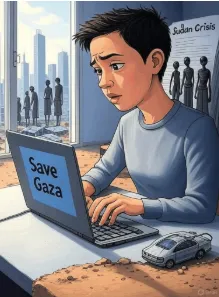by Francesaca Albanese, Agnes Callamard, Rashida Tlaib, or whichever propagandist you prefer

Geneva, July 29 - In the grand theater of global compassion, where the spotlight of outrage shines selectively, there’s an established hierarchy of suffering that demands our attention. At the pinnacle sits the plight of Gaza’s starving masses, who, despite their alleged dire circumstances, possess an almost supernatural ability to evade the camera’s lens looking anything less than zaftig. Meanwhile, Sudan, with its millions of displaced and demonstrably emaciated people, languishes in the wings, barely registering a blip on the world’s empathy radar. Allow me to explain, with a wink and a nudge, why Gaza’s invisible starvation crisis deserves our undivided attention over Sudan’s all-too-visible one.
First, consider the optics—or lack thereof. Gaza’s starving population has mastered the art of suffering off-screen. No gaunt faces or protruding ribs here, just the persistent narrative of famine that somehow never translates to those pesky visual confirmations. This makes caring about Gaza a pure act of faith, an intellectual exercise in trusting reports over reality. Sudan, on the other hand, rudely insists on parading its skeletal children and sprawling refugee camps across our screens, leaving little to the imagination. Where’s the mystery? The challenge? Caring about Sudan is like rooting for the team that’s already winning the misery Olympics—too obvious, too easy.
Then there’s the geopolitical glamour. Gaza’s suffering comes with a ready-made script: a David-and-Goliath tale of oppression that’s catnip for activists and hashtags. It’s a cause célèbre, complete with viral slogans and a cast of characters that keep the X platform buzzing. Sudan, poor Sudan, is a messier story—tribal conflicts, warlords, and a famine that’s been dragging on for years. It’s hard to distill into a tweet. Gaza’s narrative is a sleek, shareable soundbite; Sudan’s is a sprawling, footnote-heavy dissertation nobody has time to read.
Let’s not forget the bandwidth of outrage. The world’s empathy is a finite resource, and Gaza’s crisis, with its high-profile sponsors and relentless media churn, has already reserved the prime slots. Sudan’s 25 million in need—half its population—might seem like a bigger deal, but numbers are just noise without the right branding. Gaza’s got the edge in cultural cachet, with celebrities and influencers ready to amplify its plight. Sudan? It’s stuck with aid workers and UN reports, which, frankly, don’t trend. Qatari media dollars are racist.
Finally, there’s the moral superiority factor. Championing Gaza’s cause lets you signal your virtue in a way that’s globally recognized, like wearing a designer logo. Sudan’s crisis, while objectively devastating, lacks that same social currency. It’s like choosing generic cereal over the trendy brand—nobody notices your sacrifice.
So, let’s raise a toast to Gaza’s photogenic absence of emaciation and keep Sudan’s all-too-real starvation on the back burner. After all, in the economy of empathy, it’s not about who’s hungriest—it’s about who’s got the better story.
Please support - our work through Patreon.
Buy In The Biblical Sense: https://www.amazon.com/dp/B0B92QYWSL